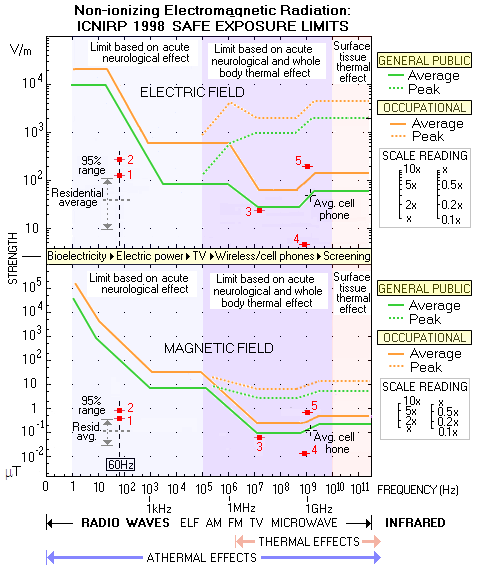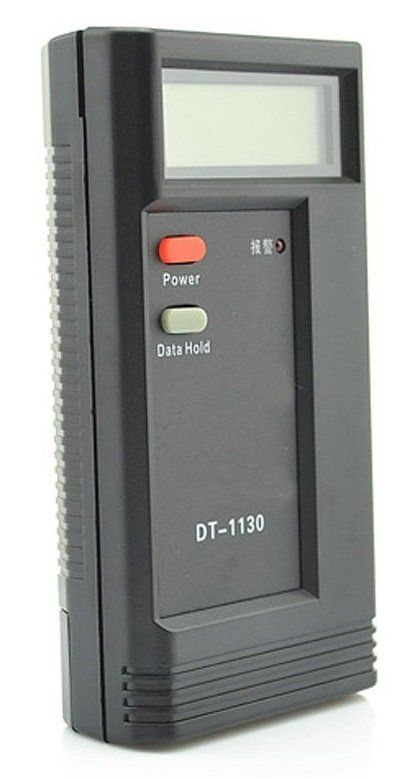Last updated Sunday January 5, 2014
EMI Concerns for EVs
All electromagnetic radiation has both an electric and magnetic component. Both can be detected and measured.

Non-ionizing electromagnetic radiation is harmless at small signal levels.
The FCC has published a safe exposure limits chart for electromagnetic radiation in the radio spectrum.

Most household appliances run at 50/60 Hertz and as such can have relatively high field strengths but still be well withing save operating levels.
I found an inexpensive EM radiation detector online. It has a digital display, and it gives relative readings of electric field fields.

It is tuned to detect and measure the electric component field magnitude in 2 frequency ranges:
- low frequency: 5Hz-400 KHz - displayed in volts/meter
- high frequency: 30MHz-2000MHz - displayed in µW/cm²
It can measure signals from 1 to 1999 V/meter (or uW/cm² if it is in the high frequency range).
The meter does indeed work. It is very sensitive and I confirmed that it will detect energy fields coming from various household appliances (a rice cooker, a cell phone, a hair drier, florescent lights, cooling fan and electrical wires inside the walls of our home).
I was not able to detect anything coming from our LCD TV or LED computer monitor (unless you touched the meter directly to the screen). Gone are the days of the low-level radio and X-ray emitting CRT screens.
This meter also serves as a valuable tool to locate live wires when doing remodeling.
You will not detect radioactive sources or any sort of ionizing radiation. Basically just stuff in the radio spectrum.
You won't detect any ghosts with this meter either, although inadvertently tapping on the front of the meter will set off false readings.
I am not certain how this meter switches between low and high frequency but I assume it just displays whichever one has the strongest signal at the time.
For example, if you are taking readings right next to a 60 Hz florescent light with a 20-60 kWh electronic ballast frequency, the meter will display in the low range. If you are taking readings near your cell phone, it will display readings in the high frequency range.
Overall, it is a great, inexpensive, in-the-ballpark reading meter. I would give it 5 stars if it could also display the band in which it was readin
Electric Vehicle Dangerous Radiation Myth:
There is a myth going around the Internet that electric vehicles emit super strong electromagnetic fields and as such are a health hazard to drive, ride in or even be near.
I was curious if this meter would detect any high level EM radiation coming from either of our electric vehicles, especially my home-made Geo EV. Unlike a Nissan Leaf (or any commercially made EV), my Geo EV did not go through extensive EMI testing and certification.
I would expect to detect at least some field reading but surprisingly, no matter how aggressive or gentle I was on the throttle, from inside the cab of the Geo EV (even with 300+ amps going through its DC brushed motor), I was not able to get the meter to even register a reading.
Perhaps it was because of the additional shielding provided by the car’s metal uni-body construction. "A Faraday cage. Cool!"
The only field that I could detect was when the car was plugged in charging and I located the EM meter a couple of inches away from the AC charging cable. It was equivalent in strength to the reading I got when measuring a rice cooker in the kitchen.
I also tried taking readings while driving the Nissan Leaf. Same result. Strait zeros. Nothing, Zilch.
